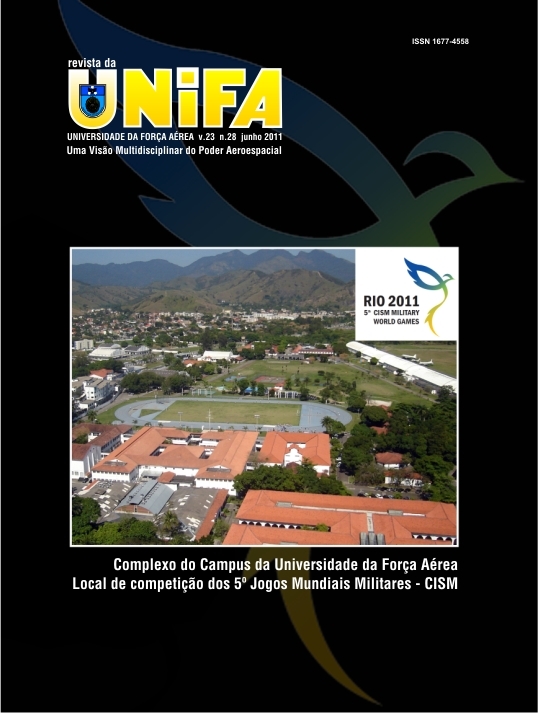Nutrition facts of the meals on board in the Brazilian Air Force
DOI:
https://doi.org/10.22480/revunifa.2011.23.645Keywords:
Boarding snack, Nutritional value, Airmen, FABAbstract
Caution attention with feeding is a factor that has been receiving a great detach importance nowadays in the current days. Enormous investments are necessary to leave airmen in operational conditions and, therefore, these workers’ health should not be left in second plan. During the missions that they perform, these soldiers, frequently, eat boarding snacks in order to replace meals or as extra food throughout the day. This work has as objective analyze the nutritional value of the on boarding snacks offered by FAB (Brazilian Air Force), consumed in substitution to one of the three main daily meals or as extra feeding, during the period of June of 2009 to June of 2010. This study based on the theoretical current that it makes reference to an individual’s nutritional needs, through established guidelines in several countries, which are ratified by Brazil through the Dietary Guidelines for the Brazilian Population, of Ministry of Health. In the rising of data, the collection was made by sampling of boarding snacks offered in the several units of the Force distributed in all of the areas of the country. The data of the research were tabulated in Software Excel, of Microsoft®, analyzed and interpreted, being verified irregular nutritional conditions in function of excesses or inadequacy of nutrients and some of their possible consequences to the health of the crew members airmen. Those results are important so that the information to be available to become aware crew members and administrators of the need of a correct nutritional swinging.
References
BRASIL. Ministério da Defesa. Portaria Normativa nº 219/MD, de 12 de fevereiro de 2010. Manual de Alimentação das Forças Armadas. Brasília: Ministério da Defesa, 2010.
BRASIL. Ministério da Saúde. Guia alimentar para a população Brasileira. Brasília: Ministério da Saúde, 2006.
______. Ministério da Saúde. Agência Nacional de Vigilância Sanitária. Resolução - RDC nº 360. Brasília: Ministério da Saúde, 2003.
CUPPARI, L. Nutrição clínica no adulto. 2. ed. São Paulo: Manole, 2005.
GIL, A. C. Como elaborar projetos de pesquisa. 4. ed. São Paulo: Atlas, 2007.
GUYTON, A. C. Tratado de fisiologia médica. 9. ed. Rio de Janeiro: Guanabara Koogan, 1996.
MAHAN, L. K.; ESCOTT-STUMP, S. Krause: Alimentos, Nutrição & Dietoterapia. 12. ed. Rio de Janeiro: Elsevier, 2010.
SIZER, F.; WHITNEY, E. Nutrição: conceitos e controvérsias. 8. ed. São Paulo: Manole, 2003.
Downloads
Published
Issue
Section
License
Copyright (c) 2011 Régis Vinícius Silva Barreto

This work is licensed under a Creative Commons Attribution-NonCommercial 4.0 International License.
Revista da UNIFA permite que o (s) autor (es) mantenha(m) seus direitos autorais sem restrições. Atribuição-NãoComercial 4.0 Internacional (CC BY-NC 4.0) - Revista da UNIFA é regida pela licença CC-BY-NC









